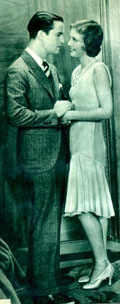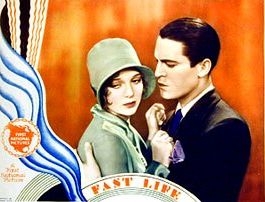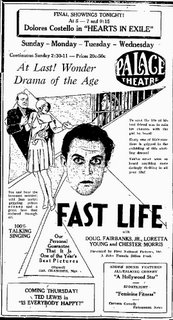 Not often, but every now and again, a period film review can serve as a window --- allowing the modern reader to invisibly slip into a theater of the dim past and briefly become part of the audience, seeing and hearing what the reviewer did through his eyes and ears.
Not often, but every now and again, a period film review can serve as a window --- allowing the modern reader to invisibly slip into a theater of the dim past and briefly become part of the audience, seeing and hearing what the reviewer did through his eyes and ears.Better still, if the review was exceptionally well written, and if you're attuned to this sort of thing, it's not impossible to transport yourself to a cinema demolished decades ago, surrounded by an audience that has similarly been returned to dust, watching a film that was allowed to rot and vanish entombed within a rusted canister tossed in the corner of a vault.
Admittedly, that all sounds rather dramatic --- but the fact remains that as we move further and further away from a point in time, what were once fixed elements all begin to fall away until we're left with only the most meager of fragments to explore, making the rare first-hand account all the more precious.
The fact that the 1929 First National film "Fast Life" had just what the title prophesied and is now deemed a lost film doesn't necessarily mean the loss is an especially grievous one. However, simply by being "lost", this automatically attaches an element of importance to even the most routine of films that, in all honesty, likely isn't deserved. To be fair, the film's featured players --- Loretta Young, Douglas Fairbanks Jr., Chester Morris --- all have their justly deserved fans, and if the film survived today it would likely be trotted out every now and again on Turner Classic Movies, serving as either part of a "birthday tribute" to any one of the film's stars. Or, more often than not, it would simply be relegated to impossibly late or early hour time slots into which vintage material such as this always seems to be carelessly flung, serving as what amounts to filler material.
 The real value to be found in "Fast Life," were it possible, is that it seems to have been mighty powerful stuff --- if not especially by late 20's film standards, then by the fact that sound itself appeared to attach weight and reality to topics and themes that seemed, in silent films, more the illusions they actually were. A true Pre-Code film in every sense of the term. Audiences, exhibitors and local censorship boards took note. Not enough to create any real fuss --- but enough to at least prompt ads like the one below, firmly barring children from attending. Then as now, I doubt this was seriously enforced --- and it likely even boosted business, but such proclamations weren't common at the time.
The real value to be found in "Fast Life," were it possible, is that it seems to have been mighty powerful stuff --- if not especially by late 20's film standards, then by the fact that sound itself appeared to attach weight and reality to topics and themes that seemed, in silent films, more the illusions they actually were. A true Pre-Code film in every sense of the term. Audiences, exhibitors and local censorship boards took note. Not enough to create any real fuss --- but enough to at least prompt ads like the one below, firmly barring children from attending. Then as now, I doubt this was seriously enforced --- and it likely even boosted business, but such proclamations weren't common at the time. So just what was "Fast Life" all about? Opening with a party sequence, we meet the two youthful leads, Loretta Young and Douglas Fairbanks, Jr. as a secretly married couple. Following the party, one of Young's admirers --- believing her fair game, creeps through her bedroom window, is thought to be an intruder and is shot dead. Fairbanks is hauled off to prison --- tried for murder and found guilty, and scheduled for a trip to the electric chair.
So just what was "Fast Life" all about? Opening with a party sequence, we meet the two youthful leads, Loretta Young and Douglas Fairbanks, Jr. as a secretly married couple. Following the party, one of Young's admirers --- believing her fair game, creeps through her bedroom window, is thought to be an intruder and is shot dead. Fairbanks is hauled off to prison --- tried for murder and found guilty, and scheduled for a trip to the electric chair.As it turns out however, the innocent intruder was actually shot dead by another guest who was skulking about, the scheming Chester Morris --- who is not only the son of the Governor, but the nephew of the prison warden as well! A set-up? Do you think?
At the last possible moment, the warden (aware of Morris' misdeed) breaks down, releases Fairbanks from the death chair, and sends the police to fetch Chester. Rather than face arrest and the wrath of his Governor-Father, Morris shoots himself dead just as the young couple are reunited.
Precisely the sort of film one would expect from Warners circa 1932 or 1933, but amidst the comedies, costume dramas and pastel hued musicals of 1929 it's not surprising that audiences didn't quite know what to make of it, and that critics thought it decidedly far fetched. It didn't perform exceptionally well at the box office, and then crept off --- never to be seen again.
 But, before we move on, let's return to the audience and critic mentioned at the start of this post. At the close of New York Times reviewer Mordaunt Hall's rather ordinary discussion of the film's plot, one of those rare windows in time that I spoke of suddenly opens:
But, before we move on, let's return to the audience and critic mentioned at the start of this post. At the close of New York Times reviewer Mordaunt Hall's rather ordinary discussion of the film's plot, one of those rare windows in time that I spoke of suddenly opens:"There is a Governor of State who, after listening to final arguments for and against the death penalty, sums up the whole business by saying: 'This has been an awful ordeal for all of us.'
A wave of modulated laughter arose from the audience, who appeared to take it for granted that the man with the power of life and death in his hands was including those in the theater in his mournful statement."
Alright, it's not much --- but because of it, we know first-hand (even if remotely) how the audience reacted to the film and interpreted an intended highly dramatic moment as one of unintentional humor. Mordaunt Hall, being his usual perceptive self, picked up on this and, as it turns out, liked the irony so much that he titled his review "An Awful Ordeal." I pay humble homage to Mr. Hall, and that audience at New York's Central theater on August 16th of 1929 by doing the same here with the title of this post.
 Failing discovery of picture and audio material for "Fast Life," all that exists for the film now is various printed matter and a set of discs for the Spanish language export version --- although it's a safe bet that the American discs survive in private hands or in an archive. Like other early Warners & First National sound films set for export, the existing synchronized Vitaphone soundtrack was removed, and accompanying visuals for the lengthy dialogue sequences were trimmed. Inter-titles (in this instance, Spanish) were then inserted wherever deemed appropriate, and the finished product was then given a new synchronized disc soundtrack --- largely music, peppered with sound effects. As was usually the case, moments of song were usually left intact or newly performed in the appropriate language, loosely --- very loosely, "dubbing" the voice for the original performer.
Failing discovery of picture and audio material for "Fast Life," all that exists for the film now is various printed matter and a set of discs for the Spanish language export version --- although it's a safe bet that the American discs survive in private hands or in an archive. Like other early Warners & First National sound films set for export, the existing synchronized Vitaphone soundtrack was removed, and accompanying visuals for the lengthy dialogue sequences were trimmed. Inter-titles (in this instance, Spanish) were then inserted wherever deemed appropriate, and the finished product was then given a new synchronized disc soundtrack --- largely music, peppered with sound effects. As was usually the case, moments of song were usually left intact or newly performed in the appropriate language, loosely --- very loosely, "dubbing" the voice for the original performer.Four extracts from the surviving Spanish language release version:
1) From the opening moments of the film, we're at the "wild party" being thrown by Young and Fairbanks. As it was in the American version, a vocal by an unnamed female vocalist singing "Fast Life" remains intact, but this then segues into the "new" material, in this case an unidentified female singer performing the film's theme song ("Since I Found You") in Spanish, replacing what I presume was Loretta Young's voice --- who herself may have been dubbed in the American version. Confused?
2) Rushing ahead past the middle portion of the film, it's time for Fairbanks to be led in a final prayer in his cell, before being led down the long, long hallway to the awaiting chair of doom. The scenes cut between Fairbanks and the last mile, the Warden thinking it all over, and an inconsolable Young in the prison office with the Governor, dabbing at her eyes. The warden relents! A phone rings! Hurry! We've only seconds before an innocent man is put to death!
3) A bit further ahead, and the jig's up for Chester Morris --- who's laying low somewhere (this portion of audio has been left intact from the original American release) but the approach of wailing sirens heralds his pending doom. Morris can be heard, faintly, sobbing.
4) Lastly, the film's theme song is heard for a moment --- but then a gunshot and scream signals Morris having had taken the coward's way out --- leaving just enough time for a glimpse of Young and Fairbanks embracing. Fade out, and then up swings the exit music recorded for the film --- a peppy rendition of the film's theme song.
###

2 comments:
I get the impression, from reading Mordaunt Hall's reviews, that he was a chap who had had his sense of humour surgically removed, and replaced with a five-gallon bottle of vitriol.
If you're going to zap a movie, see the way the one, the only Lucius Beebe did it to "Golden Dawn." The editor at the Herald Tribune was inspired when he unleashed that bon vivant on the film.
I can't say as I get the same impression of Hall as you do, but at least readers in his day had a vast choice of newspapers (and reviewers) from which to choose.
I'll admit though, that pairing up Beebe with "Golden Dawn" was a glorious explosion just waiting to happen!
Thanks for writing.
Post a Comment